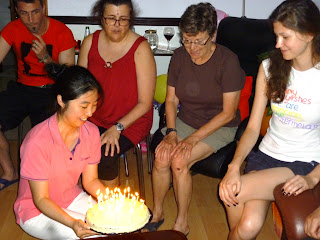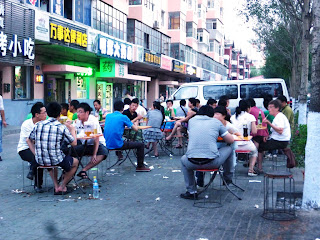It has been a tradition with Nonie and I that we do what ever it takes to surprise each other with a party on our significant birthdays. This year Nonie will celebrate a significant birthday but as a gentleman, I would never consider divulging her age. Let's just say that when we return to Canada, she will be eligible for some serious discounts, special menus and dedicated seats on the bus. Chaching!
Well, mission accomplished last night. With the help of Doctor J and Mr. President we got the apartment decked out while branson and Vicky kept Nonie busy at yoga. For my regular readers, you will remember that Chinese birthday cakes are all show and no go, so a fabulous carrot cake was ordered from Hamamma's, thanks to Brian and branson. I cleaned out the campus supermarket of birthday candles and a fire extinguisher.
Gottcha 2
Planning for our exit from China this year included an itinerary that would have Nonie wake up on her birthday in a Tibetan monastery at the base of Mount Everest. Sadly, Big Brother has decided to close Tibet for the month of July. No official reason, but this year is the 90th anniversary of the CP and they are concerned of civil unrest so don't want any foreigners witnessing it. Left a big hole in our itinerary but China has no shortage of beautiful places to visit. More on this later.

Planning for our exit from China this year included an itinerary that would have Nonie wake up on her birthday in a Tibetan monastery at the base of Mount Everest. Sadly, Big Brother has decided to close Tibet for the month of July. No official reason, but this year is the 90th anniversary of the CP and they are concerned of civil unrest so don't want any foreigners witnessing it. Left a big hole in our itinerary but China has no shortage of beautiful places to visit. More on this later.

This will be my last entry from Harbin. The next five days are filled up with lunches and dinners, saying goodbyes and lots of tears. I had planned to write something eloquent about our thoughts and feelings as our time here winds down. But I find myself struggling and its is difficult to find the words to express them. There are too many emotions swirling around to make sense of them now. I think that I will wait till we are back in Penticton and time has dulled and perhaps clarified our feelings.
We leave Harbin next Wednesday for a week in Beijing and area. We need the time to apply for a tourist visa to India. We will leave Beijing for a five day cruise on the Yang Tse. then for the next 10 days we will explore the western parts of China. We will cuddle some pandas, visit way to many monasteries and spend a day or two in Shangri La. Nonie will wake up on her birthday in Kunming, Yunnan, China. Due to the closure of Tibet,we will fly to Kathmandu and spend three days on a trek in the mountains, hopefully getting a view of Mount Everest. A few days to relax in Kathmandu before flying to Delhi and a six day drive by tour of Northern India. We fly into Montreal, meet up with our grandchildren and spend a week in Mount Tremblant. We will be landing back in Penticton on August 25 just in time for Ironman.


























 Arriving at the train station were met by family of the boss of one our our newest younguns, Viki. Viki and her boss had arranged the entire trip. Two cars were provided for our use (Mercedes and an Audi) and after a quick lunch we hit the road for a visit to the largest wet lands in China which are located a few hours out of Daching near the small city of Quiquihar. Along the way we passed through several picturesque villages. It was not uncommon to see mud walled houses with thatched roofs and a shiny new car parked out front, the modern China. The wetlands are a temporary home for the famous Chinese cranes. Sadly, we were about two weeks late with most of the cranes having moved on and only a few domesticated cranes left for us to see. Back in the cars and off to a local hot springs for some relaxing spa time. The hot springs were interesting and sadly not very hot. Tepid springs might be more descriptive. Although one pool was maintained at a hot spring like temperature. Excited by our find of a hot pool, I dipped my feet in to immediately receive first degree burns to the souls of my feet. There was probably a warning sign but not in English. With our spa time over, it was a quick ride back to Daching for a late dinner and into our hotel.
Arriving at the train station were met by family of the boss of one our our newest younguns, Viki. Viki and her boss had arranged the entire trip. Two cars were provided for our use (Mercedes and an Audi) and after a quick lunch we hit the road for a visit to the largest wet lands in China which are located a few hours out of Daching near the small city of Quiquihar. Along the way we passed through several picturesque villages. It was not uncommon to see mud walled houses with thatched roofs and a shiny new car parked out front, the modern China. The wetlands are a temporary home for the famous Chinese cranes. Sadly, we were about two weeks late with most of the cranes having moved on and only a few domesticated cranes left for us to see. Back in the cars and off to a local hot springs for some relaxing spa time. The hot springs were interesting and sadly not very hot. Tepid springs might be more descriptive. Although one pool was maintained at a hot spring like temperature. Excited by our find of a hot pool, I dipped my feet in to immediately receive first degree burns to the souls of my feet. There was probably a warning sign but not in English. With our spa time over, it was a quick ride back to Daching for a late dinner and into our hotel. A late start the next day. Nonie, Viki, branson and I wandered around in search of a coffee. Thanks to branson's good eyes we discovered a coffee/ice cream place with an open door. They were closed but some fast talking by branson how his old father was is in desperate need of a coffee fix, they relented and boiled up a cup of instant for me. Armed with some caffeine we enjoyed a breakfast of fried dumplings then headed to the local petroleum museum. A stunning building about the size of the SOEC, only more ornate and dedicated to the men and women who came in the fifties drilled for oil. Specifically one man called the "Iron Man", who it seems single handedly was responsible for sinking the fastest wells of all the drilling groups. It appeared that a photographer and camera man seem to follow him around where ever he went because they had thousands of photographs and quite a bit of film of his exploits and heroic acts. Lunch was the most interesting of places. Called the Little Piggy, it was dedicated to the glorification of pork. No part of the pork was left uneaten. We sampled tail and face. Numnum. I walked by the show case to see heart, liver, and and especially tasty looking brain on display.
A late start the next day. Nonie, Viki, branson and I wandered around in search of a coffee. Thanks to branson's good eyes we discovered a coffee/ice cream place with an open door. They were closed but some fast talking by branson how his old father was is in desperate need of a coffee fix, they relented and boiled up a cup of instant for me. Armed with some caffeine we enjoyed a breakfast of fried dumplings then headed to the local petroleum museum. A stunning building about the size of the SOEC, only more ornate and dedicated to the men and women who came in the fifties drilled for oil. Specifically one man called the "Iron Man", who it seems single handedly was responsible for sinking the fastest wells of all the drilling groups. It appeared that a photographer and camera man seem to follow him around where ever he went because they had thousands of photographs and quite a bit of film of his exploits and heroic acts. Lunch was the most interesting of places. Called the Little Piggy, it was dedicated to the glorification of pork. No part of the pork was left uneaten. We sampled tail and face. Numnum. I walked by the show case to see heart, liver, and and especially tasty looking brain on display. A bit of time to explore Daching before it was time to head back to the train station, a quick shoe shine and on to Harbin on an even more crowded train then our previous one.
A bit of time to explore Daching before it was time to head back to the train station, a quick shoe shine and on to Harbin on an even more crowded train then our previous one.